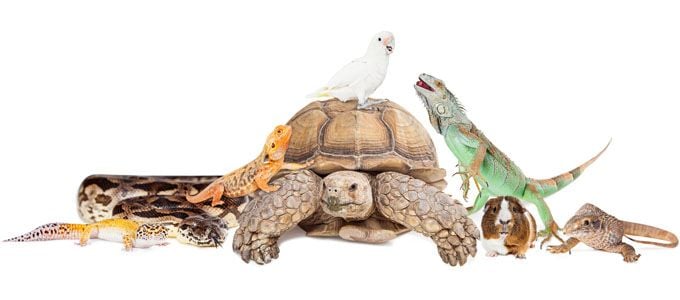Bloat and gastric torsion is a serious condition and your pet should be rushed to the emergency room if this occurs. Certain breeds of dogs with deep chests and narrow waists, such as hounds, bouvier des Flandres, or doberman pinschers are more susceptible to a syndrome of gastric torsion and bloat. This
Read more

Cats and dogs are amazing pets to have, but you may be considering something a little more...exotic. Exotic pets may not be as popular as other animals that you are used to seeing as part of a family’s household, but they can be just as fun, rewarding, and easy to form bonds with!
Birds, for example, are highly intelligent animals that can be taught to or vocalize. Turtles, if provided the proper habitat and dietary requirements, can be another great addition to your home with their unique personalities. Reptiles are quiet, low-maintenance, scaly friends that can also offer you companionship without all the hassle. Read more below to discover what type of care each of these animals needs and if they’re right for you.
-
Bloat and Gastric Torsion
-
Tapeworms
Tapeworms live in the digestive tracts of vertebrates as adults and often in the bodies of various animals as juveniles. In a tapeworm infection, adults absorb food predigested by the host, so the worms have no need for a digestive tract or a mouth. Large tapeworms are made almost entirely of reproductive
Read more -
Seizures
Seizures are common in dogs, but more unusual in cats. Seizures are just symptoms which can occur with many kinds of diseases. They can happen because of diseases outside the brain or inside the brain. Low blood sugar that can happen with an overdose of insulin or with a tumor of the pancreas can cause
Read more -
Ruptured Anterior Cruciate Ligament (ACL)
The rupture of the cruciate ligament is the most common knee injury in the dog. This injury has two common presentations. One is the young athletic dog playing roughly who acutely ruptures the ligament and is non-weight bearing on the affected hind leg. The second presentation is the older, overweight
Read more -
Luxating Patella
Luxating patella is a condition where the kneecap (patella) moves out of its normal position. Luxating patella is one of the most common knee joint abnormalities of dogs, but it is only occasionally seen in cats. It may affect one or both of the knees. In some cases it moves (luxates) towards the inside
Read more
32of103


